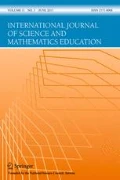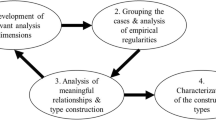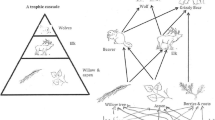Abstract
Raising scientifically literate citizens has been the main concern of the science education community. Socioscientific issues (SSIs) provide a context to facilitate individuals to expand their epistemic understanding and develop scientific reasoning skills such as evidence-based argumentation and consensus building. In this qualitative research, we examined how preservice middle school science teachers (PSTs) embedded the nature of science (NOS) aspects via physical dynamic models (PDM) that they developed on SSIs. We specifically focused on how PSTs scientifically explained the SSIs in their PDMs by explicitly incorporating and reflecting on the NOS aspects. Slightly more than half of the groups succeeded in developing models with dynamic/functional feature that enabled their classmates to predict, hypothesize, test, observe, infer, and generate an explanation of the SSI during presentations. Almost half of the PSTs could not differentiate between demonstration and functional/dynamic models. We additionally used the VNOS-C questionnaire to assess PSTs’ NOS understanding at the beginning and end of the semester. The VNOS-C results showed that PSTs improved on all NOS aspects at the end of the semester. However, among seven NOS aspects that we focused on in our study, creativity and imagination, empirical evidence, and inferential reasoning were explicitly used in PSTs’ presentations of SSI using PDMs. Their presentations did not address subjectivity, tentativeness, social and cultural influence, and theory and law aspects. We recommend replicating this study in different science contexts. Integrating NOS aspects into physical dynamic models needs to be further investigated.





Similar content being viewed by others
References
Akerson, V. L., Abd-El-Khalick, F., & Lederman, N. G. (2000). Influence of a reflective explicit activity-based approach on elementary teachers’ conceptions of nature of science. Journal of Research in Science Teaching, 37(4), 295–317. https://doi.org/10.1002/(SICI)1098-2736(200004)37:43.0.CO;2-2
Akerson, V., Nargund-Joshi, V., Weiland, I., Pongsanon, K., & Avsar, B. (2014). What third-grade students of differing ability levels learn about nature of science after a year of instruction. International Journal of Science Education, 36(2), 244–276. https://doi.org/10.1080/09500693.2012.761365
Akerson, V. L., Avsar Erumit, B., & Elcan Kaynak, N. (2019a). Teaching Nature of Science through children’s literature: An early childhood preservice teacher study. International Journal of Science Education, 41(18), 2765–2787. https://doi.org/10.1080/09500693.2019.1698785
Akerson, V. L., Elcan Kaynak, N., & Avsar Erumit, B. (2019b). Development of third graders' identities as “persons who understand nature of science” through a gravity unit. International Journal of Research in Education and Science, 5(2), 450–456.
Atasoy, Ş. (2018). Öğretmen adaylarının yaşam alanlarına göre yerel sosyobilimsel konularla ilgili informal muhakemeleri [Informal reasoning of preservice teachers about local socioscientific issues]. Fen Bilimleri Öğretimi Dergisi, 6(1), 60–72.
Atasoy, Ş., Tekbıyık, A., & Yüca, O. Ş. (2019). Karadeniz Bölgesi’ndeki bazı yerel sosyobilimsel konularda öğrencilerin informal muhakemelerinin belirlenmesi: HES, organik çay ve yeşil yol projesi [Examining students’ informal reasoning about local socioscientific issues in the Blacksea region: HES, organic tea, and greenway project]. Hacettepe Üniversitesi Eğitim Fakültesi Dergisi, 34(2), 524–540.
Avsar Erumit, B., & Akerson, V. L. (2022). Using children’s literature in the middle school science class to teach nature of science. Science & Education, 31(3), 713–737. https://doi.org/10.1007/s11191-021-00274-3
Avsar Erumit, B., Fouad, K. E., & Akerson, V. L. (2019). How do learner-directed scientific investigations influence students’ questioning and their nature of science conceptions? International Journal of Education in Mathematics, Science and Technology, 7(1), 20–31.
Barnett, M., Barab, S. A., & Hay, K. E. (2001). The virtual solar system project: Student modeling of the solar system. The Journal of College Science Teaching, 30(5), 300–305.
Bell, R. L., & Lederman, N. G. (2003). Understandings of the nature of science and decision making on science and technology based issues. Science Education, 87(3), 352–377. https://doi.org/10.1002/sce.10063
Boulter, C. J., & Buckley, B. C. (2000). Constructing a typology of models for science education. In J. K. Gilbert & C. J. Boulter (Eds.), Developing models in science education (pp. 41–57). Springer. https://doi.org/10.1007/978-94-010-0876-1_3
Bourgeois-Bougrine, S., Buisine, S., Vandendriessche, C., Glaveanu, V., & Lubart, T. (2017). Engineering students’ use of creativity and development tools in conceptual product design: What, when and how? Thinking Skills and Creativity, 24, 104–117. https://doi.org/10.1016/j.tsc.2017.02.016
Buckley, B. C. (2000). Interactive multimedia and model-based learning in biology. International Journal of Science Education, 22(9), 895–935. https://doi.org/10.1080/095006900416848
Buckley, B. C., & Boulter, C. J. (2000). Investigating the role of representations and expressed models in building mental models. In J. K. Gilbert & C. J. Boulter (Eds.), Developing models in science education (pp. 119–135). Springer.
Chang Rundgren, S.-N., & Rundgren, C.-J. (2010). SEE-SEP: From a separate to a holistic view of socioscientific issues. Asia-Parcific Forum on Science Learning and Teaching, 11(1), 2.
Clement, J. (2002). Protocol evidence on thought experiments used by experts. In W. Gray & C. Schunn (Eds.), Proceedings of the twenty-fourth annual conference of the cognitive science society (p. 32). Erlbaum.
Clement, J. (Ed.) (2008). Creative model construction in scientists and students: The role of imagery, analogy, and mental simulation. Springer.
Cofré, H., Núñez, P., Santibáñez, D., Pavez, J. M., Valencia, M., & Vergara, C. (2019). A critical review of students’ and teachers’ understandings of nature of science. Science & Education, 28(3–5), 205–248. https://doi.org/10.1007/s11191-019-00051-3
Cropley, D. H., Kaufman, J. C., & Cropley, A. J. (2011). Measuring creativity for innovation management. Journal of Technology Management & Innovation, 6(3), 13–30.
Demir, A., & Namdar, B. (2021). The effect of modeling activities on Grade 5 students’ informal reasoning about a real-life issue. Research in Science Education, 51(Suppl. 1), 429–442. https://doi.org/10.1007/s11165-019-09896-8
Duit, R. (1998). Towards multi-perspective views of science learning and instruction. In Paper presented at the Annual Meeting of the American Educational Research Association.
Duit, R., & Treagust, D. (1998). Learning in science – From behaviourism towards social constructivism and beyond. In B. Fraser & K. Tobin (Eds.), International handbook of science education (pp. 3–26). Kluwer.
Eastwood, J. L., Sadler, T. D., Zeidler, D. L., Lewis, A., Amiri, L., & Applebaum, S. (2012). Contextualizing nature of science instruction in socioscientific issues. International Journal of Science Education, 34(15), 2289–2315. https://doi.org/10.1080/09500693.2012.667582
Eymur, G. (2019). The influence of the explicit nature of science instruction embedded in the argument-driven inquiry method in chemistry laboratories on high school students’ conceptions about the nature of science. Chemistry Education Research and Practice, 20(1), 17–29. https://doi.org/10.1039/C8RP00135A
Ford, M. (2008). Disciplinary authority and accountability in scientific practice and learning. Science Education, 92(3), 404–423. https://doi.org/10.1002/sce.20263
Friedrichsen, P., Sadler, T., Graham, K., & Brown, P. (2016). Design of a socio-scientific issue curriculum unit: Antibiotic resistance, natural selection, and modeling. International Journal of Designs for Learning, 7(1), 1–18.
Gilbert, J. K., & Boulter, C. J. (Eds.). (2000). Developing models in science education. Kluwer.
Gobert, J. D., & Buckley, B. C. (2000). Introduction to model-based teaching and learning in science education. International Journal of Science Education, 22(9), 891–894. https://doi.org/10.1080/095006900416839
Harrison, A. G., & Treagust, D. F. (1998). Modelling in science lessons: Are there better ways to learn with models? School Science and Mathematics, 98(8), 420–429. https://doi.org/10.1111/j.1949-8594.1998.tb17434.x
Ingham, A. M., & Gilbert, J. K. (1991). The use of analogue models by students of chemistry at higher education level. International Journal of Science Education, 13(2), 193–202. https://doi.org/10.1080/0950069910130206
Johnson, J., Macalalag Jr., A. Z., & Dunphy, J. (2020). Incorporating socioscientific issues into a STEM education course: Exploring teacher use of argumentation in SSI and plans for classroom implementation. Disciplinary and Interdisciplinary Science Education Research, 2(1), 9. https://doi.org/10.1186/s43031-020-00026-3
Johnson-Laird, P. N. (1983). Mental models. Harvard University Press.
Kampourakis, K. (2016). The “general aspects” conceptualization as a pragmatic and effective means to introducing students to nature of science. Journal of Research in Science Teaching, 53(5), 667–682. https://doi.org/10.1002/tea.21305
Karisan, D., & Zeidler, D. L. (2017). Contextualization of nature of science within the socioscientific issues framework: A review of research. International Journal of Education in Mathematics, Science and Technology, 5(2), 139–152. https://doi.org/10.18404/ijemst.270186
Ke, L., Sadler, T. D., Zangori, L., & Friedrichsen, P. J. (2021). Developing and using multiple models to promote scientific literacy in the context of socio-scientific issues. Science & Education, 30(3), 589–607. https://doi.org/10.1007/s11191-021-00206-1
Khishfe, R. (2012a). Nature of science and decision-making. International Journal of Science Education, 34(1), 67–100. https://doi.org/10.1080/09500693.2011.559490
Khishfe, R. (2012b). Relationship between nature of science understandings and argumentation skills: A role for counter argument and contextual factors. Journal of Research in Science Teaching, 49(4), 489–514. https://doi.org/10.1002/tea.21012
Khishfe, R., & Abd-El-Khalick, F. (2002). Influence of explicit and reflective versus implicit inquiry-oriented instruction on sixth graders’ views of nature of science. Journal of Research in Science Teaching, 39(7), 551–578. https://doi.org/10.1002/tea.10036
Kinskey, M., & Zeidler, D. (2021). Elementary preservice teachers’ challenges in designing and implementing socioscientific issues-based lessons. Journal of Science Teacher Education, 32(3), 350–372. https://doi.org/10.1080/1046560X.2020.1826079
Lederman, N. G. (2007). Nature of science: Past, present, and future. In S. K. Abell & N. G. Lederman (Eds.), Handbook of research on science education (pp. 831–879). Erlbaum.
Lederman, N. G., & Lederman, J. S. (2014). Research on teaching and learning of nature of science. In N. G. Lederman & S. K. Abell (Eds.), Handbook of research on science education (Vol. II, pp. 614–634). Routledge.
Lederman, N. G., Abd-El-Khalick, F., Bell, R. L., & Schwartz, R. S. (2002). Views of nature of science questionnaire: Toward valid and meaningful assessment of learners’ conceptions of nature of science. Journal of Research in Science Teaching, 39(6), 497–521. https://doi.org/10.1002/tea.10034
Lederman, N. G., Antink, A., & Bartos, S. (2014). Nature of science, scientific inquiry, and socio-scientific issues arising from genetics: A pathway to developing a scientifically literate citizenry. Science & Education, 23(2), 285–302. https://doi.org/10.1007/s11191-012-9503-3
Lederman, N. G., Abd-El-Khalick, F., & Smith, M. U. (2019). Teaching nature of scientific knowledge to kindergarten through University students. Science & Education, 28(3), 197–203. https://doi.org/10.1007/s11191-019-00057-x
Lemons, G., Carberry, A., Swan, C., Jarvin, L., & Rogers, C. (2010). The benefits of model building in teaching engineering design. Design Studies, 31(3), 288–309. https://doi.org/10.1016/j.destud.2010.02.001
Leung, J. S. C. (2020). Students’ adherences to epistemic understanding in evaluating scientific claims. Science Education, 104(2), 164–192. https://doi.org/10.1002/sce.21563
Leung, J. S. C. (2022). A practice-based approach to learning nature of science through socioscientific issues. Research in Science Education, 52(1), 259–285. https://doi.org/10.1007/s11165-020-09942-w
Louca, L. T., & Zacharia, Z. C. (2012). Modeling-based learning in science education: Cognitive, metacognitive, social, material and epistemological contributions. Educational Review, 64(4), 471–492. https://doi.org/10.1080/00131911.2011.628748
Maia, P. F., & Justi, R. (2009). Learning of chemical equilibrium through modelling-based teaching. International Journal of Science Education, 31(5), 603–630. https://doi.org/10.1080/09500690802538045
Merriam, S. B., & Tisdell, E. J. (2015). Qualitative research: A guide to design and implementation. John Wiley & Sons.
Mulvey, B. K., & Bell, R. L. (2017). Making learning last: Teachers’ long-term retention of improved nature of science conceptions and instructional rationales. International Journal of Science Education, 39(1), 62–85. https://doi.org/10.1080/09500693.2016.1267879
Nersessian, N. J. (1999). Model-based reasoning in conceptual change. In Model-based reasoning in scientific discovery (pp. 5–22). Springer. https://doi.org/10.1007/978-1-4615-4813-3_1
NGSS Lead States. (2013). Next generation science standards: For states, by states. National Academies Press.
Organisation for Economic Co-operation and Development [OECD]. (2019). Learning Compass 2030. Retrieved April 12, 2022, from https://www.oecd.org/education/2030-project/teaching-and-learning/learning/
Owens, D. C., Sadler, T. D., & Zeidler, D. L. (2017). Controversial issues in the science classroom. Phi Delta Kappan, 99(4), 45–49. https://doi.org/10.1177/0031721717745544
Patton, M. Q. (1999). Enhancing the quality and credibility of qualitative analysis. Health Services Rresearch, 34(5 Pt 2), 1189–1208.
Peel, A., Zangori, L., Friedrichsen, P., Hayes, E., & Sadler, T. (2019). Students’ model-based explanations about natural selection and antibiotic resistance through socio-scientific issues-based learning. International Journal of Science Education, 41(4), 510–532. https://doi.org/10.1080/09500693.2018.1564084
Rivet, A. E., & Kastens, K. A. (2012). Developing a construct-based assessment to examine students’ analogical reasoning around physical models in Earth Science. Journal of Research in Science Teaching, 49(6), 713–743. https://doi.org/10.1002/tea.21029
Sadler, T. D. (2009). Situated learning in science education: Socio-scientific issues as contexts for practice. Studies in Science Education, 45(1), 1–42. https://doi.org/10.1080/03057260802681839
Sadler, T. D. (2011). Situating socio-scientific issues in classrooms as a means of achieving goals of science education. In T. D. Sadler (Ed.), Socio-scientific issues in the classroom: Teaching, learning and research (pp. 1–9). Springer. https://doi.org/10.1007/978-94-007-1159-4_1
Sadler, T. D., Chambers, F. W., & Zeidler, D. L. (2004). Student conceptualizations of the nature of science in response to a socioscientific issue. International Journal of Science Education, 26(4), 387–409. https://doi.org/10.1080/0950069032000119456
Sadler, T. D., Friedrichsen, P., & Zangori, L. (2019). A framework for teaching for socio-scientific issue and model based learning (SIMBL). Educação e Fronteiras/Education and Borders, 9(25), 8–26. https://doi.org/10.30612/eduf.v9i25.11006
Seel, N. M. (2017). Model-based learning: A synthesis of theory and research. Educational Technology Research and Development, 65(4), 931–966. https://doi.org/10.1007/s11423-016-9507-9
Sensevy, G., Tiberghien, A., Santini, J., Laubé, S., & Griggs, P. (2008). An epistemological approach to modeling: Cases studies and implications for science teaching. Science Studies and Science Education, 92(3), 424–446. https://doi.org/10.1002/sce.20268
Shi, X. (2021). Using explicit teaching of philosophy to promote understanding of the nature of science. Science & Education, 30(2), 409–440. https://doi.org/10.1007/s11191-020-00173-z
Stratford, S. J., Krajcik, J., & Soloway, E. (1998). Secondary students’ dynamic modeling processes: Analyzing, reasoning about, synthesizing, and testing models of stream ecosystems. Journal of Science Education and Technology, 7(3), 215–234. https://doi.org/10.1023/A:1021840407112
Summers, R., Abd-El-Khalick, F., & Brunner, J. (2020). Evidence and rationale for expanding the views of nature of science questionnaire. Teaching, Leadership & Professional Practice Faculty Publications, 7 https://commons.und.edu/tlpp-fac/7
Tytler, R., Duggan, S., & Gott, R. (2001). Dimensions of evidence, the public understanding of science and science education. International Journal of Science Education, 23(8), 815–832.
White, B. Y., Collins, A., & Frederiksen, J. R. (2011). The nature of scientific meta-knowledge. In M. S. Khine & I. M. Saleh (Eds.), Models and modeling: Cognitive tools for scientific enquiry (pp. 41–76). Springer. https://doi.org/10.1007/978-94-007-0449-7_3
Windschitl, M., Thompson, J., & Braaten, M. (2008). Beyond the scientific method: Model-based inquiry as a new paradigm of preference for school science investigations. Science Education, 92(5), 941–967. https://doi.org/10.1002/sce.20259
Zangori, L., Peel, A., Kinslow, A., Friedrichsen, P., & Sadler, T. D. (2017). Student development of model-based reasoning about carbon cycling and climate change in a socio-scientific issues unit. Journal of Research in Science Teaching, 54(10), 1249–1273. https://doi.org/10.1002/tea.21404
Zeidler, D. L. (2014). Socioscientific issues as a curriculum emphasis: Theory, research and practice. In N. G. Lederman & S. K. Abell (Eds.), Handbook of research on science education (Vol. 2, pp. 697–796). Routledge.
Zeidler, D. L., & Nichols, B. H. (2009). Socioscientific issues: Theory and practice. Journal of Elementary Science Education, 21(2), 49. https://doi.org/10.1007/BF03173684
Zeidler, D. L., & Sadler, T. D. (2008). Social and ethical issues in science education: A prelude to action. Science & Education, 17(8), 799–803. https://doi.org/10.1007/s11191-007-9130-6
Zeidler, D. L., Walker, K. A., Ackett, W. A., & Simmons, M. L. (2002). Tangled up in views: Beliefs in the nature of science and responses to socioscientific dilemmas. Science Education, 86(3), 343–367. https://doi.org/10.1002/sce.10025
Zeidler, D. L., Applebaum, S. M., & Sadler, T. D. (2011). Enacting a socioscientific issues classroom: Transformative transformations. In D. L. Zeidler (Ed.), Socio-scientific issues in the classroom (pp. 277–305). Springer. https://doi.org/10.1007/978-94-007-1159-4_16
Author information
Authors and Affiliations
Corresponding author
Additional information
Publisher's Note
Springer Nature remains neutral with regard to jurisdictional claims in published maps and institutional affiliations.
Supplementary Information
Below is the link to the electronic supplementary material.
Rights and permissions
About this article
Cite this article
Avsar Erumit, B., Yuksel, T. Developing and Using Physical Dynamic Models On Socioscientific Issues to Present Nature Of Science Ideas. Int J of Sci and Math Educ 21, 1031–1056 (2023). https://doi.org/10.1007/s10763-022-10296-0
Received:
Accepted:
Published:
Issue Date:
DOI: https://doi.org/10.1007/s10763-022-10296-0




